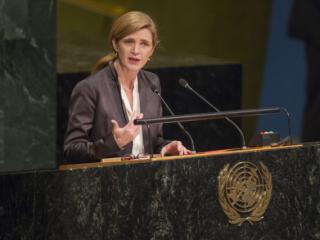Listener Bill Lowman's Dangerous Idea? Historically Black Colleges and Universities (HBCUs) need to be one of the lead agencies to define and defend African humanity.More
Politics and History
How do you plan for retirement? Parker Palmer talks with Jim Fleming about the challenges of forging a new identity once you've given up your career.More
Tyrone Muhammad is tired of seeing so many young black men die from street violence. So the Newark mortician is using an in-your-face strategy to show people the effects of that violence: taking his work into the streets.More
Karen King tells Anne Strainchamps that there are many early Christian texts that didn't make it into the Bible.More
Kyle Bowser is the producer of "The Bible Experience" — a 19-CD audio recording of the New Testament featuring a celebrity all-black cast.More
Historian Garry Wills details Jefferson’s complex relationship with slavery and says its legacy still haunts us.More
Garry Wills is a Pulitzer Prize-winning historian and a practicing Catholic. He tells Jim Fleming that the apostle Paul didn't say most of the things people blame him for.More
Brian Boyd talks with Anne Strainchamps about how our love of storytelling helped us evolve.More
Writer Karen Armstrong's dangerous idea is to love your enemies.More
Bart Ehrman talks about the complex set of beliefs that existed in the early days of Christianity and says it was several hundred years before a single version of the truth was negotiated.More
Pranks aren’t just for April Fool’s Day. Sometimes they can be powerful vehicles for political and social change.More
Ann Gibbons is an award-winning science writer and author of “The First Human: The Race to Discover Our Earliest Ancestors.”More
Larry Brilliant is best known as part of the United Nations team of doctors responsible for curing smallpox. But back in the 1960s, he was a hippie whose guru told him his destiny was to help cure smallpox.More
One way to survive on not quite enough sleep? Writer Daniel Pink swears by what he calls a "nappuccino," a short nap with a cup of coffee. You might want to take notes on this one.More
Staff meetings, family reunions, dinner parties — even with all the digital ways we have to connect, face-to-face gatherings are still a regular part of our lives. Priya Parker thinks we need new traditions to make those gatherings meaningful.More
Steven Pinker presents a Dangerous Idea: things today are actually better than they've ever been.More
Conceptually, hope feels big, amorphous, hard to define exactly. But for the past few months, "To The Best Of Our Knowledge" producers have been trying anyway. Scientists, activists, futurists, theologians, artists, authors all weighed in on what they think when they hear the word "hope."More
Samantha Power was President Obama's ambassador to the UN, taking part in life-and-death decisions, including whether to launch military strikes. She talks about her two biggest foreign policy challenges — whether to intervene in Libya and Syria.More
















